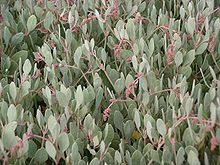Halimione portulacoides
| Halimione portulacoides | |
|---|---|
 |
|
| Scientific classification | |
| Kingdom: | Plantae |
| (unranked): | Angiosperms |
| (unranked): | Eudicots |
| (unranked): | Core eudicots |
| Order: | Caryophyllales |
| Family: | Amaranthaceae |
| Subfamily: | Chenopodioideae |
| Genus: | Halimione |
| Species: | H. portulacoides |
| Binomial name | |
|
Halimione portulacoides (L.) Aellen |
|
Halimione portulacoides or sea purslane (2n=36) is a small greyish-green shrub widely distributed in temperate Eurasia and parts of Africa.
A halophyte, it is found in salt marshes and coastal dunes, and is usually flooded at high tide.
The plant grows to 75 cm. It is evergreen, and in northern temperate climates it flowers from July to September. The flowers are monoecious and are pollinated by wind.
The edible leaves can be eaten raw in salads or cooked as a potherb. They are thick and succulent with a crunchy texture and a natural saltiness.
Halimione portulacoides occurs at the sea shores of western and southern Europe, and from the Mediterranean Sea to western Asia.
Botanical synonyms include Atriplex portulacoides L. and Obione portulacoides (L.) Moq. Recent phylogenetic research revealed, that Halimione is a distinct genus and can not be included in Atriplex.
...
Wikipedia
